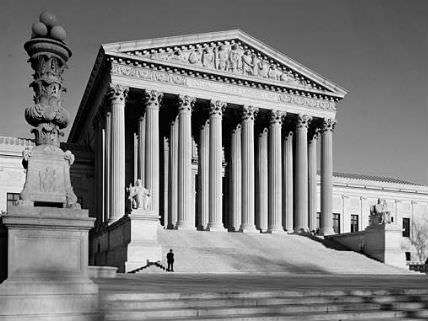A Conservative Wish List of SCOTUS Candidates Shows the Influence of the Libertarian Legal Movement
Texas Justice Don Willett makes the cut.

The U.S. Supreme Court is on the verge of a major shake-up. When the next president takes office in January 2016, the Court will have three members whose respective ages make retirement (or death) a genuine possibility during that president's first term. Those justices are Ruth Bader Ginsburg, who will be 83 in January, Anthony Kennedy, who will be 80, and Stephen Breyer, who will be 78. And then of course there is the vacancy created by the recent death of Antonin Scalia. If the current GOP opposition to Obama nominee Merrick Garland continues to hold, the next president may well end up replacing Scalia as well.
Let's assume the next president is a Republican. What sort of SCOTUS nominee can we expect from a GOP-controlled White House? As it happens, the Heritage Foundation, an influential Washington think tank with deep ties to the Republican Party, has just released a wish list of eight names that "illustrates the kind of highly qualified, principled individuals the new president should consider." At the very least, we can expect any Republican presidential candidate (not to mention his advisers) to give serious thought to these suggestions. Here's the list, as compiled by John G. Malcom, the director of Heritage's Ed Meese III Center for Legal and Judicial Studies:
William Pryor Jr. (Judge, 11th U.S. Circuit Court of Appeals)
Diane Sykes (Judge, 7th U.S. Circuit Court of Appeals)
Steven Colloton (Judge, 8th U.S. Circuit Court of Appeals)
Raymond Gruender (Judge, 8th U.S. Circuit Court of Appeals)
Brett Kavanaugh (Judge, U.S. Court of Appeals for the D.C. Circuit)
Don Willett (Justice, Texas Supreme Court)
Paul Clement (43rd solicitor general of the United States, currently in private practice)
Mike Lee (U.S. Senator, Utah)
It's an interesting group. One name that certainly stands out is Sen. Mike Lee. The last time a president named a senator to the Supreme Court was 1937, when Franklin Roosevelt gave the nod to former Klansman and reliable New Dealer Hugo Black. Black went on to have a massive impact—for better and for worse—on the course of 20th century constitutional law.
It's not difficult to imagine Senate Republicans throwing their support behind Lee, a well-liked colleague. The real question is whether any Senate Democrats would cross the line. Given Lee's sharp criticism of N.S.A. spying, as well as his support for criminal justice reform, it's at least possible that one or more liberal-minded Senators might give him some degree of support.
But the name that really jumps out from the list is Justice Don Willett of the Texas Supreme Court. Willett has excellent conservative credentials (he's also wonderful on Twitter). Willett worked in the George W. Bush Administration's Office of Faith-Based and Community Initiatives, served as counsel to Texas Attorney General Greg Abbott (the current governor), and was appointed to the state's highest court by Gov. Rick Perry.
Willett also happens to be extremely popular in libertarian legal circles, particularly for his powerful concurring opinion in the 2015 case of Patel v. Texas Department of Licensing and Regulation, in which the Texas Supreme Court struck down a preposterous occupational licensing scheme. "This case is fundamentally about the American Dream and the unalienable human right to pursue happiness without curtsying to government on bended knee," Willett wrote. "It is about whether government can connive with rent-seeking factions to ration liberty unrestrained, and whether judges must submissively uphold even the most risible encroachments." (I'm happy to add that Willett cited my book in this opinion.)
Thirty years ago it would have been practically unthinkable for the Heritage Foundation to put someone who had written something like that on its SCOTUS short list. Why? Because the conservative legal establishment at that point in time was overwhelmingly hostile to the judicial protection of economic liberty on the grounds that such Lochner-esque behavior by the courts amounted to warrantless "judicial activism." For example, in 1984 then-Judge Antonin Scalia urged conservatives and libertarians to adopt a thoroughgoing posture of judicial deference in all cases pertaining to economic regulation and to forgo any efforts to persuade the courts to correct "whatever evils may have accrued from undue judicial abstention in the economic field."
Fast forward to the present and we suddenly find none other than the Heritage Foundation, an organization that sits at the commanding heights of the conservative establishment, openly praising Justice Willett for his judicial action on behalf of "the ability to earn a living free from unreasonable government restraints." Needless to say, Willett's approach is the opposite of the "judicial abstention" championed by Scalia and his fellow conservative advocates of deference, including conservative legal icon Robert Bork.
What this tells me is that the libertarian legal movement is slowly but surely refocusing the national debate over constitutional law and the proper role of the courts. The Scalia-Bork approach is no longer the only game in town and an increasing number of conservative legal activists are giving the libertarian alternative a serious look.


Show Comments (21)